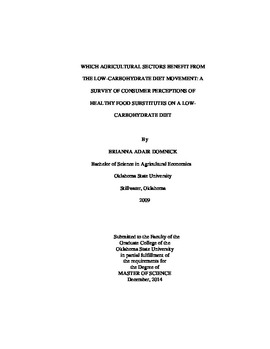| dc.contributor.advisor | Campiche, Jody | |
| dc.contributor.author | Domnick, Brianna Adair | |
| dc.date.accessioned | 2016-01-20T15:44:31Z | |
| dc.date.available | 2016-01-20T15:44:31Z | |
| dc.date.issued | 2014-12-01 | |
| dc.identifier.uri | https://hdl.handle.net/11244/25646 | |
| dc.description.abstract | Since 1980, it has been a responsibility of the United States Department of Health and Human Services (HHS) and the United States Department of Agriculture (USDA) to review the Dietary Guidelines every five years and update them if necessary. Several studies have shown that many Americans are aware of the dietary guidelines but choose not to follow the guidelines for various reasons (Gregory, Smith, and Wendt 2011). In 2012, ABC News estimated that 108 million Americans were on a diet, and that the annual revenue of the diet industry was approximately $20 billion (ABC News 2012). It is clear that the diet industry plays a major role in the lives of many Americans. These diets vary greatly in their approach and methodology for successful weight loss. Some popular diets encourage the reduction of carbohydrates such as the Atkins, South Beach and Paleo diets, which are also referred to as low-carbohydrate diets. This research evaluates potential impacts of low-carbohydrate diets on various sectors of the agricultural industry. More specifically, this research examines consumer preferences and perceptions of healthy carbohydrate substitutes while attempting to lose weight on a low-carbohydrate diet. A survey was conducted to evaluate the perception of diets and nutrition. Ordered logit models were estimated to analyze survey responses. In the first model, consumer perceptions regarding the effectiveness of particular diets were evaluated. A second model was estimated to determine if a statistically significant difference existed between diet ratings by individuals with an overweight or obese BMI (body mass index) and those with a healthy BMI. Results showed that the vegetable industry is more positively impacted than animal agriculture by the popularity of low-carbohydrate diets. BMI did not have a significant impact on perceptions of diets. | |
| dc.format | application/pdf | |
| dc.language | en_US | |
| dc.publisher | Oklahoma State University | |
| dc.rights | Copyright is held by the author who has granted the Oklahoma State University Library the non-exclusive right to share this material in its institutional repository. Contact Digital Library Services at lib-dls@okstate.edu or 405-744-9161 for the permission policy on the use, reproduction or distribution of this material. | |
| dc.title | Which Agricultural Sectors Benefit from the Low-carbohydrate Diet Movement: a Survey of Consumer Perceptions of Healthy Food Substitutes on a Low-carbohydrate Diet | |
| dc.type | text | |
| dc.contributor.committeeMember | Jones, Rodney | |
| dc.contributor.committeeMember | Warren, Jason | |
| osu.filename | Domnick_okstate_0664M_13666.pdf | |
| osu.accesstype | Open Access | |
| dc.description.department | Agricultural Economics | |
| dc.type.genre | Thesis | |
